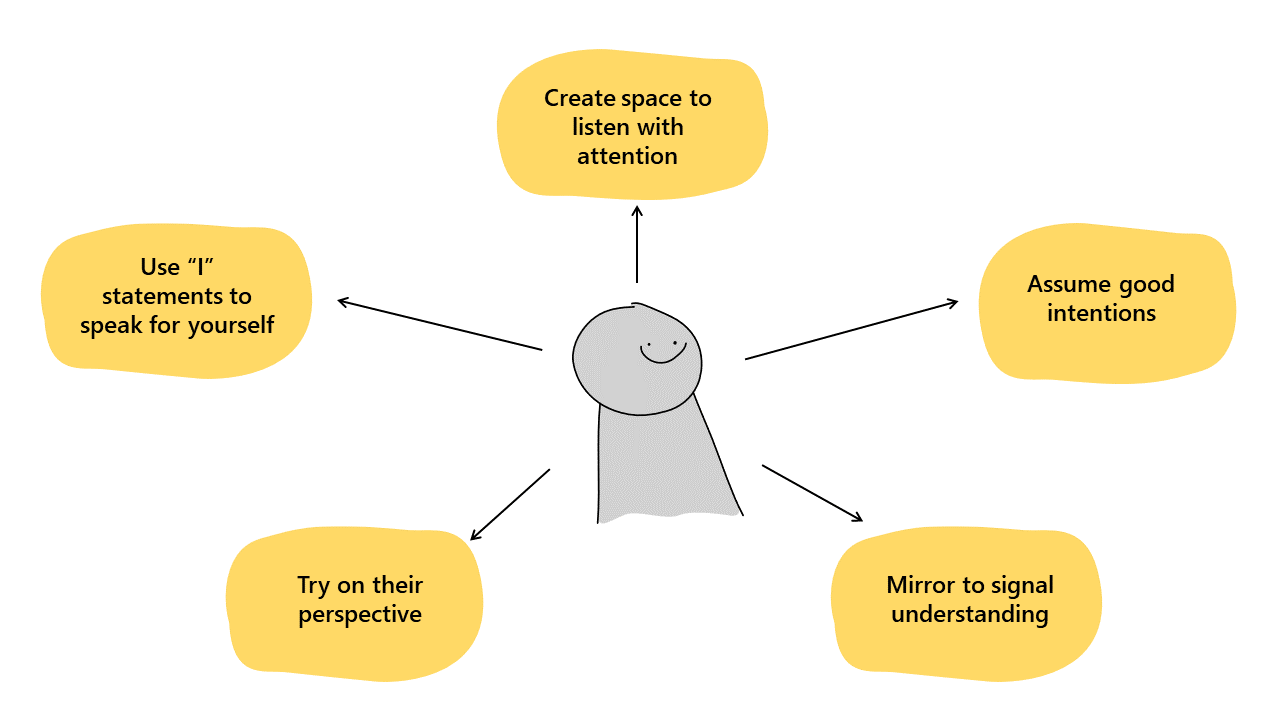Exercise - Reflect on active listening techniques
You now have a better understanding of the importance of active listening in effective communication and teamwork in computer science.

Apply active listening
In this unit, you'll reflect on how you might apply active listening in stressful situations or conflicts. Consider the following scenarios at your coding camp.
Scenario 1
A team of six participants is animatedly discussing changes they need to make to a code snippet. You notice that one of the team members is excitedly trying to share something. They repeatedly try to join the conversation, but others interrupt them. After a while, they give up trying to express their thoughts and are silent for the rest of the meeting.
After you review this situation, reflect on the following questions and note your answers:
- Did the group practice active listening?
- What could the group have done so that the team member could share their ideas?
- As a facilitator, how would you attempt to resolve this situation?
Here are some suggested answers to the preceding questions:
- Did the group practice active listening?
- No. By interrupting their team member, the group wasn't sharing the air or listening to them. They were communicating what they needed to share, but not giving their teammate a chance to do the same.
- What could the group do so that the team member could share their ideas?
- The group could "share the air" and mindfully give their teammate time and attention to share their ideas. They could take turns sharing and ensure that everyone got a chance to provide their input. They could also practice mirroring to ensure they completely understand the person who is sharing.
- As a facilitator, how would you attempt to resolve this situation?
- To resolve this situation, you could:
- Pause the discussion and revisit your ground rules.
- Acknowledge that the rest of the team was talking over the team member.
- Remind the team that they need to share the air, listen to their teammate, and ask clarifying questions to make sure they understand what they're trying to convey.
- Revisit the importance of listening with purpose and trying on the other person's perspective. This way, the team could try out their teammate's coding suggestion and include it in their problem-solving process.
- To resolve this situation, you could:
Scenario 2
Suppose you're discussing a new app your team needs to use to track their time on the project. One team member remarks that the app isn't user friendly, and they dislike it. They don't realize that you worked on it. How can you respond to this criticism in a way that incorporates active listening?
Suggested answer: You might understandably be surprised or hurt by this statement, but it's important to remember to pause, create space to listen, and understand the other person's perspective. You could say something like "Can you give me more details about your experience? I'm interested in hearing more about your opinion. I worked on this app and would appreciate your input."
You can mirror the other person as they convey their feedback and ensure that you clearly understand what they're saying. Try on their perspective as a user of the app. You might discover areas of improvement that you were previously unaware of. Assume that the team member has good intentions and move forward with positive intent.
Reflect on your active listening skills
Review the following questions. Think about your responses and note them on a device or piece of paper. Note areas that you need to work on more than others:
- Can you think of a time when you were listening to someone and, afterwards, you realized they didn't feel listened to? Which active listening skills could you have applied, and how do you think they would have made a difference in the outcome of the situation?
- Are you patient when someone comes across as arrogant or if they talk too much out of turn?
- Do you like listening to feedback from different people and then mirroring back and synthesizing that feedback?
- If there's an awkward moment after a conflict in a group setting, what steps would you take to reduce the tension?
- Do you ever interrupt someone when they're sharing because you feel like they're speaking out of turn, going off tangent, or saying something inaccurate? How do you react in such situations?
- How will you encourage open and respectful communication in a group setting?